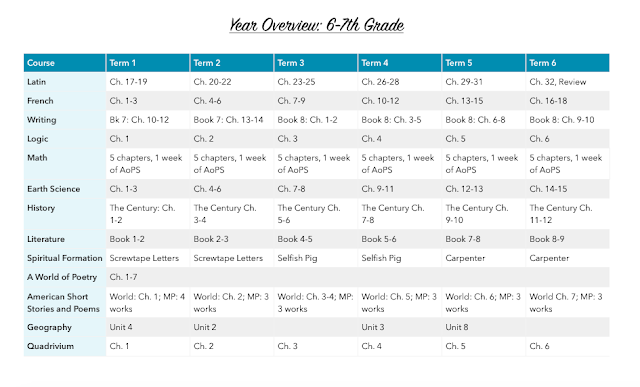Year-Long Term Planning
A few years ago, I started doing year-long planning for one subject over the summer. It started with history. I tried to basically plan out our books and projects for the year so I could have the books ready to go, and the project supplies on hand in hopes these things would actually get done. When my oldest kids were 3rd-4th-5th this was a great way to save some time over the course of the year by doing long-range planning in the summer. But as they've grown, I've started expanding this long-range planning to other subjects.
Last year, I added science because the older kids wanted to study the human body. Since I haven't ever loved Apologia and it was the only ready-made curriculum for elementary I could find on anatomy, I decided to put together our down study. I had a few resources chosen, and I laid out which chapters coincided with each other, and what order we'd do them in, how long we'd give to each body system, etc. This worked out really well for us last year and left me with very few decisions to make during the school year. Decisions make me tired. :)
So this year, I decided to try this for *all* the subjects to eliminate almost all big-picture decisions throughout the course of the year. I've realized that once I have the science book out to plan six weeks, or even one week, it doesn't take that much longer to keep going and plan the whole year. Actually, it's easier to just go ahead and do the whole year.
I look at the program/book/resource and divide it into six equal portions (as even as I can make it). Since we homeschool on a sabbath schedule, we do six, six-week terms each year. So those six portions get divided down further into six chunks. These chunks are what will be assigned each week. Then I plot them on my spreadsheet. I love spreadsheets. :)
From the year overview, I move over to a term spreadsheet. Once I have one term's worth of work listed out in one column, it's pretty simple and straightforward to just break it up into six chunks and plan it over six weeks. Once I see exactly what a week will consist of for them, I can see clearly if what I'm expecting and planning is reasonable for my kids. This is our first year with official middle school material, and I have been feeling like I've over-shot for them. When I started looking at the books, the amount of reading and work, I realized I had. But if I reduce some of the less-necessary subjects and put them on a loop, we can still do a lot of what I had hoped to do. I wouldn't have known this if I hadn't taken a week this summer to look at each subject in-depthly. Then I would have been scrambling mid-year to figure out what to cut, where to go, how to make things work. I know this because it's happened before. I get totally de-railed. :)
At the same time, I plot out all the books the kids will read for every subject so I can get a feel for their reading load. Of course, I have a spreadsheet for this as well. Since we kind of follow Tapestry of Grace, I set it up by 9-week Units. Since my older kids are getting most of their history from The Century by Peter Jennings this year, they will have a few biographies to read each unit alongside and that's about it. My younger kids have a longer reading list which will mostly be read aloud. Picking and choosing books ahead of time helps me have a real plan and not be overwhelmed with all the options. I've had years where I was just overwhelmed with all the books to the point that we hardly read any of them. :) Making a list before hand of the ones I really want to make sure we read helps me to work that list and get them read.
Hopefully this year, I won't get totally de-railed when things don't go to plan. I'll hold this plan loosely and be flexible, but it helps me keep my goals in sight. I take what's on these spread sheets and just copy it onto the weekly assignments sheets in just a few minutes each Sunday afternoon...
Last year, I added science because the older kids wanted to study the human body. Since I haven't ever loved Apologia and it was the only ready-made curriculum for elementary I could find on anatomy, I decided to put together our down study. I had a few resources chosen, and I laid out which chapters coincided with each other, and what order we'd do them in, how long we'd give to each body system, etc. This worked out really well for us last year and left me with very few decisions to make during the school year. Decisions make me tired. :)
So this year, I decided to try this for *all* the subjects to eliminate almost all big-picture decisions throughout the course of the year. I've realized that once I have the science book out to plan six weeks, or even one week, it doesn't take that much longer to keep going and plan the whole year. Actually, it's easier to just go ahead and do the whole year.
I look at the program/book/resource and divide it into six equal portions (as even as I can make it). Since we homeschool on a sabbath schedule, we do six, six-week terms each year. So those six portions get divided down further into six chunks. These chunks are what will be assigned each week. Then I plot them on my spreadsheet. I love spreadsheets. :)
This is the whole year. I can see exactly what will be assigned in each track for the whole year. This process really allows me to see if I've over-planned (almost always) or under-planned (almost never!). From here, I can make decisions about subjects that are top priority, or subjects that are more elective and good for looping or only for half the year. This allows us to get a lot more done! The top few subjects or courses are year-long things. The further down you go, the more flexible I am with these subjects. I have them on loops for certain days, and what's on here is what will be assigned for the term its listed under. These are goals, and are held loosely. :)
From the year overview, I move over to a term spreadsheet. Once I have one term's worth of work listed out in one column, it's pretty simple and straightforward to just break it up into six chunks and plan it over six weeks. Once I see exactly what a week will consist of for them, I can see clearly if what I'm expecting and planning is reasonable for my kids. This is our first year with official middle school material, and I have been feeling like I've over-shot for them. When I started looking at the books, the amount of reading and work, I realized I had. But if I reduce some of the less-necessary subjects and put them on a loop, we can still do a lot of what I had hoped to do. I wouldn't have known this if I hadn't taken a week this summer to look at each subject in-depthly. Then I would have been scrambling mid-year to figure out what to cut, where to go, how to make things work. I know this because it's happened before. I get totally de-railed. :)
At the same time, I plot out all the books the kids will read for every subject so I can get a feel for their reading load. Of course, I have a spreadsheet for this as well. Since we kind of follow Tapestry of Grace, I set it up by 9-week Units. Since my older kids are getting most of their history from The Century by Peter Jennings this year, they will have a few biographies to read each unit alongside and that's about it. My younger kids have a longer reading list which will mostly be read aloud. Picking and choosing books ahead of time helps me have a real plan and not be overwhelmed with all the options. I've had years where I was just overwhelmed with all the books to the point that we hardly read any of them. :) Making a list before hand of the ones I really want to make sure we read helps me to work that list and get them read.
Hopefully this year, I won't get totally de-railed when things don't go to plan. I'll hold this plan loosely and be flexible, but it helps me keep my goals in sight. I take what's on these spread sheets and just copy it onto the weekly assignments sheets in just a few minutes each Sunday afternoon...
How do you plan for the year? If you've never tried year-long or term planning like this, pick one subject and give it a try! See if it helps reduce your decisions and time spent on planning through the year. It helps me reduce decisions mid-stream, eliminates pulling out all the books every six weeks (or even every weekend!) to decide what to do next. With these spread sheets and a few hours over the summer, I have a plan for the whole year that allows me to just do the next thing every week. It frees me up to actually read many of the things the kids are reading and have meaningful conversation with them about it. Less time planning, more time playing!






Comments
Post a Comment